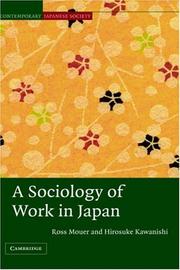| Listing 1 - 10 of 16 | << page >> |
Sort by
|

ISBN: 9780521722216 9780521856935 9780511510069 9780511415395 0511415397 0521856930 0521722217 0511510063 1107177103 9781107177109 1281751367 9781281751362 9786611751364 661175136X 0511414714 9780511414718 0511413114 9780511413117 0511412177 9780511412172 051141403X Year: 2008 Publisher: Cambridge ; New York : Cambridge University Press,
Abstract | Keywords | Export | Availability | Bookmark
 Loading...
Loading...Choose an application
- Reference Manager
- EndNote
- RefWorks (Direct export to RefWorks)
This book explains how postwar Japan managed to achieve a highly egalitarian form of capitalism despite meager social spending. Estevez-Abe develops an institutional, rational-choice model to solve this puzzle. She shows how Japan's electoral system generated incentives that led political actors to protect various groups that lost out in market competition. She explains how Japan's postwar welfare state relied upon various alternatives to orthodox social spending programs. The initial postwar success of Japan's political economy has given way to periods of crisis and reform. This book follows this story up to the present day. Estevez-Abe shows how the current electoral system renders obsolete the old form of social protection. She argues that institutionally Japan now resembles Britain and predicts that Japan's welfare system will also come to resemble Britain's. Japan thus faces a more market-oriented society and less equality.
Public welfare --- Welfare state --- J4000.90 --- J4216 --- J4300.90 --- State, Welfare --- Economic policy --- Social policy --- State, The --- Welfare economics --- History --- Japan: Social history, history of civilization -- postwar Shōwa (1945- ), Heisei period (1989- ), contemporary --- Japan: Sociology and anthropology -- social policy and pathology -- social welfare, social security --- Japan: Economy and industry -- history -- postwar Shōwa (1945- ), Heisei period (1989- ), contemporary --- Japan --- Economic conditions. --- History. --- Social Sciences --- Political Science

ISBN: 9780520235052 0520936590 9786612762734 1282762737 9780520936591 0585466106 9780585466101 9780520217546 0520217543 0520235053 1597348015 9781597348010 0520217543 0520235053 661276273X 9781282762732 Year: 2002 Publisher: Berkeley University of California Press
Abstract | Keywords | Export | Availability | Bookmark
 Loading...
Loading...Choose an application
- Reference Manager
- EndNote
- RefWorks (Direct export to RefWorks)
Are Japanese families in crisis? In this dynamic and substantive study, Merry Isaacs White looks back at two key moments of "family making" in the past hundred years -- the Meiji era and postwar period -- to see how models for the Japanese family have been constructed. The models had little to do with families of their eras and even less to do with families today, she finds. She vividly portrays the everyday reality of a range of families: young married couples who experience fleeting togetherness until the first child is born; a family separated by job shifts; a family with a grandmother as babysitter; a marriage without children.
Families --- J4170 --- J4000.90 --- J4330 --- Japan: Sociology and anthropology -- family --- Japan: Social history, history of civilization -- postwar Shōwa (1945- ), Heisei period (1989- ), contemporary --- Japan: Economy and industry -- demography, population theory --- 20th century. --- anthropology. --- contemporary families. --- demographic studies. --- family making. --- family models. --- family relationships. --- family. --- global powers. --- historical. --- japan. --- japanese families. --- japanese history. --- marriage and family. --- meiji era. --- modern history. --- modern japan. --- nonfiction study. --- nontraditional families. --- postwar japan. --- social customs. --- social studies. --- sociologists. --- sociology. --- students and teachers. --- textbooks. --- traditional families.
Book
ISBN: 0691601909 1400862426 9781400862429 9780691078953 9780691601908 9780691631509 Year: 1991 Publisher: Princeton Princeton University Press
Abstract | Keywords | Export | Availability | Bookmark
 Loading...
Loading...Choose an application
- Reference Manager
- EndNote
- RefWorks (Direct export to RefWorks)
To understand how change occurs in politics, we should turn from concentrating on intentional political actions to exploring everyday life, especially marginal frames of mind in which people are open to questioning existing ideas and institutions. In so contending, Takako Kishima offers fresh understandings of contemporary Japanese politicians and the Japanese political process, while she also proposes an innovative method of looking at politics in general. Kishima points out that taken-for-granted values and beliefs are revealed as arbitrary when people experience intrusions of the marginal, or'liminal.'Social marginals, such as outcastes or so-called misfits, are the most likely people to invoke these intrusions, but more ordinary folk are also subjected to them under special conditions ranging from the seemingly trivial--daydreaming, dancing, or getting drunk--to the more profound--war, natural disaster, or ecstatic ritual. During an intrusion the flow of ordinary time seems to stop, and the utilitarian principles of commonplace existence are invalidated--as described by the chapter on Nakasone,'Shedding Tears: Suspension of Politics.'Drawing on insights from phenomenology, symbolic anthropology, and post-structuralism, as well as from political science, Kishima shows that the prevalence of liminal experiences in society prevents the reification of authority, allows the transcendence of formal political differences, and permits political change over time.
Politicians --- Marginality, Social --- Political development. --- Social change. --- Japan --- Politics and government --- Social conditions --- Change, Social --- Cultural change --- Cultural transformation --- Societal change --- Socio-cultural change --- Development, Political --- Exclusion, Social --- Marginal peoples --- Social exclusion --- Social marginality --- Social history --- Social evolution --- Political science --- Assimilation (Sociology) --- Culture conflict --- Social isolation --- Sociology --- People with social disabilities --- Social change --- Political development --- J4600.90 --- J4000.90 --- Japan: Politics and law -- history -- postwar Shōwa (1945- ), Heisei period (1989- ), contemporary --- Japan: Social history, history of civilization -- postwar Shōwa (1945- ), Heisei period (1989- ), contemporary --- E-books
Book
ISBN: 1003033903 036746957X 9781003033905 9781000057713 1000057712 9781000057652 1000057658 9781000057591 1000057593 9780367469573 9780367471682 036747168X Year: 2020 Publisher: New York : Routledge,
Abstract | Keywords | Export | Availability | Bookmark
 Loading...
Loading...Choose an application
- Reference Manager
- EndNote
- RefWorks (Direct export to RefWorks)
"This book situates the 2020 Tokyo Olympics within the social, economic and political challenges facing contemporary Japan. Using the 2020 Tokyo Olympics as a lens into the city and the country as a whole, the stellar line up of contributors offer hidden insights and new perspectives on the Games. These include city planning, cultural politics, financial issues, language use, security, education, volunteerism and construction work. The chapters then go on to explore the many stakeholders, institutions, citizens, interest groups, and protest groups involved, and feature the struggle over Tokyo's extreme summer heat, food standards, the implementation of diversity around disabilities, sexual minorities and technological innovations. Giving short glimpses into the new Olympic sports, this book also analyses the role of these sports in Japanese society. Japan Through the Lens of the Tokyo Olympics will be of huge interest to anyone attending the Olympic Games in Tokyo 2020. It will also be useful to students and scholars of the Olympics and the sociology of sport, as well as Japanese culture and society"--
Olympics --- Popular culture --- J6902 --- J6900.90 --- J4000.90 --- J4300.90 --- Culture, Popular --- Mass culture --- Pop culture --- Popular arts --- Communication --- Intellectual life --- Mass society --- Recreation --- Culture --- Games, Olympic --- Olympic games --- Summer Olympics --- Sports --- Planning --- Political aspects --- Economic aspects --- Social aspects --- Security measures&delete& --- Japan: Sports and recreation -- societies, organizations, congresses, periodicals, tournaments and events --- Japan: Sports and recreation -- history -- postwar Shōwa (1945- ), Heisei period (1989- ), contemporary --- Japan: Social history, history of civilization -- postwar Shōwa (1945- ), Heisei period (1989- ), contemporary --- Japan: Economy and industry -- history -- postwar Shōwa (1945- ), Heisei period (1989- ), contemporary --- Japan --- Social life and customs. --- E-books --- Planning. --- Security measures

ISBN: 1282356135 9786612356131 0585105200 052091144X 9780520911444 9780585105208 9780520074750 0520074750 0520074742 0520074750 9780520074743 6612356138 9781282356139 Year: 1993 Publisher: Berkeley (Calif.): University of California press,
Abstract | Keywords | Export | Availability | Bookmark
 Loading...
Loading...Choose an application
- Reference Manager
- EndNote
- RefWorks (Direct export to RefWorks)
Japan's catapult to world economic power has inspired many studies by social scientists, but few have looked at the 45 years of postwar Japan through the lens of history. The contributors to this book seek to offer such a view. As they examine three related themes of postwar history, the authors describe an ongoing historical process marked by unexpected changes, such as Japan's extraordinary economic growth, and unanticipated continuities, such as the endurance of conservative rule. A provocative set of interpretative essays by eminent scholars, this book will appeal to anyone interested in the history of twentieth-century Japan and the dilemmas facing Japan today.
HISTORY / Asia / General. --- Japan --- History --- 92 --- JP / Japan - Japon --- J3390 --- J4000.90 --- Geschiedenis. --- Histoire. --- History. --- 92 Geschiedenis. --- 92 Histoire. --- 92 History. --- Geschiedenis --- Japan: History -- Gendai, modern -- postwar Shōwa (1945- ), Heisei period (1989- ), contemporary --- Japan: Social history, history of civilization -- postwar Shōwa (1945- ), Heisei period (1989- ), contemporary --- 1945 - 1989 --- Conditions sociales --- Politique et gouvernement --- Japon --- Histoire --- Japan - History - 1945 --- -Conditions sociales --- -Japan --- 21st century. --- academic. --- asian countries. --- asian history. --- contemporary. --- eastern world. --- economic power. --- economics. --- economy. --- essay collection. --- international. --- japan. --- japanese economy. --- japanese government. --- japanese history. --- japanese politics. --- japanese power. --- japanese. --- modern history. --- modern world. --- postwar japan. --- postwar. --- research. --- scholarly. --- social problems. --- social science. --- social scientists. --- wartime. --- world history. --- world war 2. --- wwii.
Book
ISBN: 0520947673 9786612732560 1282732560 9780520947672 9780520262706 0520262700 0520262719 9780520262713 Year: 2010 Publisher: Berkeley, Calif. London University of California Press
Abstract | Keywords | Export | Availability | Bookmark
 Loading...
Loading...Choose an application
- Reference Manager
- EndNote
- RefWorks (Direct export to RefWorks)
Making Japanese Citizens is an expansive history of the activists, intellectuals, and movements that played a crucial role in shaping civil society and civic thought throughout the broad sweep of Japan's postwar period. Weaving his analysis around the concept of shimin (citizen), Simon Avenell traces the development of a new vision of citizenship based on political participation, self-reliance, popular nationalism, and commitment to daily life. He traces civic activism through six phases: the cultural associations of the 1940's and 1950's, the massive U.S.-Japan Security Treaty protests of 1960, the anti-Vietnam War movement, the antipollution and antidevelopment protests of the 1960's and 1970's, movements for local government reform and the rise of new civic groups from the mid-1970's. This rich portrayal of activists and their ideas illuminates questions of democracy, citizenship, and political participation both in contemporary Japan and in other industrialized nations more generally.
Political activists --- Civil society --- Citizenship --- Activists, Political --- Persons --- Political participation --- Social contract --- Japan --- Politics and government --- J4000.90 --- J4127 --- J4628 --- Japan: Social history, history of civilization -- postwar Shōwa (1945- ), Heisei period (1989- ), contemporary --- Japan: Sociology and anthropology -- social identity and self --- Japan: Politics and law -- state -- citizenship --- asia scholars. --- asian studies. --- civic activism. --- civic groups. --- civic thought. --- contemporary japan. --- democracy. --- government reform. --- historians. --- industrialized nations. --- japan. --- japanese citizens. --- japanese history. --- japanese society. --- local government. --- modern history. --- political participation. --- popular nationalism. --- postwar era. --- postwar japan. --- protests. --- retrospective. --- self reliance. --- shimin mythology. --- social activists. --- social cultural history. --- social movements.
Book
ISBN: 0804798567 9780804798563 9780804797078 0804797072 9780804798532 0804798532 Year: 2016 Publisher: Stanford, California
Abstract | Keywords | Export | Availability | Bookmark
 Loading...
Loading...Choose an application
- Reference Manager
- EndNote
- RefWorks (Direct export to RefWorks)
The Strange Child examines how the Japanese financial crisis of the 1990s gave rise to "the child problem," a powerful discourse of social anxiety that refocused concerns about precarious economic futures and shifting ideologies of national identity onto the young. Andrea Gevurtz Arai's ethnography details the different forms of social and cultural dislocation that erupted in Japan starting in the late 1990s. Arai reveals the effects of shifting educational practices; increased privatization of social services; recessionary vocabulary of self-development and independence; and the neoliberalization of patriotism. Arai argues that the child problem and the social unease out of which it emerged provided a rationale for reimagining governance in education, liberalizing the job market, and a new role for psychology in the overturning of national-cultural ideologies. The Strange Child uncovers the state of nationalism in contemporary Japan, the politics of distraction around the child, and the altered life conditions of—and alternatives created by—the recessionary generation.
Education --- Patriotism --- National characteristics, Japanese. --- Recessions --- Business cycles --- Depressions --- Japanese national characteristics --- Children --- Education, Primitive --- Education of children --- Human resource development --- Instruction --- Pedagogy --- Schooling --- Students --- Youth --- Civilization --- Learning and scholarship --- Mental discipline --- Schools --- Teaching --- Training --- Social aspects --- Psychological aspects. --- Japan --- Social conditions --- National characteristics, Japanese --- Psychological aspects --- J4935 --- J4900.90 --- J4122 --- J4000.90 --- J4204.10 --- Japan: Education -- educational psychology and sociology --- Japan: Education -- history -- postwar Shōwa (1945- ), Heisei period (1989- ), contemporary --- Japan: Sociology and anthropology -- nationalism --- Japan: Social history, history of civilization -- postwar Shōwa (1945- ), Heisei period (1989- ), contemporary --- Japan: Sociology and anthropology -- communities -- age groups -- children, infants
Book
ISBN: 9780511761409 9780521192576 9781107544796 9780511932885 051193288X 0521192579 1107214041 9781107214040 1282918745 9781282918740 9786612918742 6612918748 0511931549 9780511931543 0511925158 9780511925153 0511761406 0511930208 9780511930201 051185272X 051192769X 1107544793 Year: 2010 Publisher: Cambridge ; New York : Cambridge University Press,
Abstract | Keywords | Export | Availability | Bookmark
 Loading...
Loading...Choose an application
- Reference Manager
- EndNote
- RefWorks (Direct export to RefWorks)
Despite reduced incomes, diminished opportunities for education, and the psychological trauma of defeat, Japan experienced a rapid rise in civic engagement in the immediate aftermath of World War II. Why? Civic Engagement in Postwar Japan answers this question with a new general theory of the growth in civic engagement in postwar democracies. It argues that wartime mobilization unintentionally instills civic skills in the citizenry, thus laying the groundwork for a postwar civic engagement boom. Meanwhile, legacies of prewar associational activities shape the costs of association-building and information-gathering, thus affecting the actual extent of the postwar boom. Combining original data collection, rigorous statistical methods, and in-depth historical case analyses, this book illuminates one of the keys to making postwar democracies work.
Civil society --- Political participation --- Postwar reconstruction --- J3390 --- J4000.90 --- J4600.90 --- Post-conflict reconstruction --- Reconstruction, Postwar --- Citizen participation --- Community action --- Community involvement --- Community participation --- Involvement, Community --- Mass political behavior --- Participation, Citizen --- Participation, Community --- Participation, Political --- Political activity --- Political behavior --- Political rights --- Social participation --- Political activists --- Politics, Practical --- Social contract --- History --- Japan: History -- Gendai, modern -- postwar Shōwa (1945- ), Heisei period (1989- ), contemporary --- Japan: Social history, history of civilization -- postwar Shōwa (1945- ), Heisei period (1989- ), contemporary --- Japan: Politics and law -- history -- postwar Shōwa (1945- ), Heisei period (1989- ), contemporary --- Japan --- Politics and government --- Citizen participation. --- Social Sciences --- Political Science

ISBN: 0521651204 9780521651202 0521658454 9780521658454 9780511610387 0511111304 9780511111303 0511110979 9780511110979 0511610386 1280415029 9781280415029 9786610415021 6610415021 1107128250 0511181302 0511197918 0511326742 Year: 2005 Publisher: Cambridge Cambridge University Press
Abstract | Keywords | Export | Availability | Bookmark
 Loading...
Loading...Choose an application
- Reference Manager
- EndNote
- RefWorks (Direct export to RefWorks)
What shapes the decisions of employees in Japan? The authors of this comprehensive and up-to-date survey of the relationship between work and society in Japan argue that individual decisions about work can only be understood through the broader social context. Many factors combine to affect such choices including the structuring of labour markets, social policy and, of course, global influences which have come increasingly to impinge on the organisation of work and life generally. By considering labour markets, social policy and relationships between labour and management, the book offers penetrating insights into contemporary Japanese society and glimpses of what might come in the future. Underlying the discussion is a challenge to the celebration of Japanese management practices which has dominated the literature for the last three decades. This is an important book for students of sociology and economics.
Sociology of work --- Japan --- Industrial management --- Work --- Gestion d'entreprise --- Travail --- Japon --- Social conditions --- Economic conditions --- Conditions sociales --- Conditions économiques --- J4350 --- J4360 --- J4300.90 --- J4000.90 --- -Work --- -Industry (Psychology) --- Method of work --- Work, Method of --- Human behavior --- Labor --- Occupations --- Work-life balance --- Business administration --- Business enterprises --- Business management --- Corporate management --- Corporations --- Industrial administration --- Management, Industrial --- Rationalization of industry --- Scientific management --- Management --- Business --- Industrial organization --- Japan: Economy and industry -- labor and employment --- Japan: Economy and industry -- business methods and management --- Japan: Economy and industry -- history -- postwar Shōwa (1945- ), Heisei period (1989- ), contemporary --- Japan: Social history, history of civilization -- postwar Shōwa (1945- ), Heisei period (1989- ), contemporary --- -Economic conditions --- -J4350 --- -Japan: Economy and industry -- labor and employment --- -Sociology of work --- -Industrial management --- Conditions économiques --- Industry (Psychology) --- Japanese management --- Social Sciences --- Sociology

ISBN: 9780801444333 0801444330 0801461804 9780801461804 0801474450 Year: 2006 Publisher: Ithaca, N.Y. : Cornell University Press,
Abstract | Keywords | Export | Availability | Bookmark
 Loading...
Loading...Choose an application
- Reference Manager
- EndNote
- RefWorks (Direct export to RefWorks)
Contrary to all expectations, Japan's long-term recession has provoked no sustained political movement to replace the nation's malfunctioning economic structure. The country's basic social contract has so far proved resistant to reform, even in the face of persistently adverse conditions. In Race for the Exits, Leonard J. Schoppa explains why it has endured and how long it can last. The postwar Japanese system of "convoy capitalism" traded lifetime employment for male workers against government support for industry and the private (female) provision of care for children and the elderly. Two social groups bore a particularly heavy burden in providing for the social protection of the weak and dependent: large firms, which committed to keeping their core workforce on the payroll even in slow times, and women, who stayed home to care for their homes and families.Using the exit-voice framework made famous by Albert Hirschman, Schoppa argues that both groups have chosen "exit" rather than "voice," depriving the political process of the energy needed to propel necessary reforms in the system. Instead of fighting for reform, firms slowly shift jobs overseas, and many women abandon hopes of accommodating both family and career. Over time, however, these trends have placed growing economic and demographic pressures on the social contract. As industries reduce their domestic operations, the Japanese economy is further diminished. Japan has also experienced a "baby bust" as women opt out of motherhood. Schoppa suggests that a radical break with the Japanese social contract of the past is becoming inevitable as the system slowly and quietly unravels.
Social security --- Economic security --- Human services --- Sécurité sociale --- Sécurité économique --- Services sociaux --- Japan --- Japon --- Economic conditions --- Social conditions --- Social policy. --- Economic policy --- Conditions économiques --- Conditions sociales --- Politique sociale --- Politique économique --- Social policy --- J4216 --- J4210 --- J4301 --- J4000.90 --- -Economic security --- -Human services --- -Services, Human --- Security, Economic --- Welfare economics --- Insurance, Social --- Insurance, State and compulsory --- Social insurance --- Insurance --- Income maintenance programs --- Japan: Sociology and anthropology -- social policy and pathology -- social welfare, social security --- Japan: Sociology and anthropology -- social policy and pathology --- Japan: Economy and industry -- policy, legislation, guidelines, codes of behavior --- Japan: Social history, history of civilization -- postwar Shōwa (1945- ), Heisei period (1989- ), contemporary --- -Economic conditions --- -Social policy. --- -J4216 --- -Social security --- Sécurité sociale --- Sécurité économique --- Conditions économiques --- Politique économique --- Services, Human --- Social security - Japan --- Economic security - Japan --- Human services - Japan --- Japan - Social conditions - 1945 --- -Japan - Economic conditions - 1989 --- -Japan - Social policy --- Japan - Economic policy - 1989 --- 1989-.... --- 1945-....
| Listing 1 - 10 of 16 | << page >> |
Sort by
|

 Search
Search Feedback
Feedback About UniCat
About UniCat  Help
Help News
News